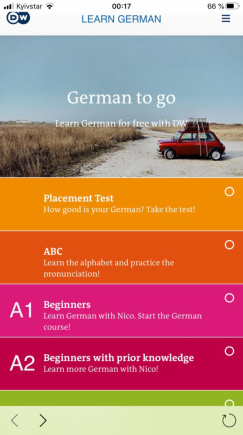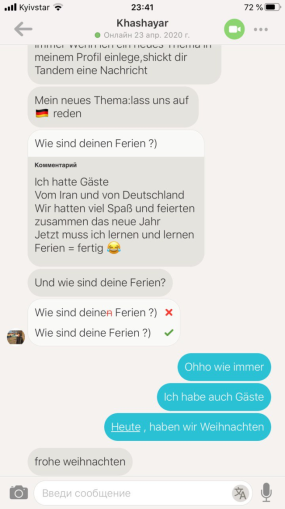Сan a mobile application help in learning a foreign language
CAN A MOBILE APPLICATION OF LEARNING A FOREIGN LANGUAGE SERVE AS AN IMPORTANT TOOL IN IMPROVING SPEAKING SKILLS ?
Mobile phones and other digital devices have become an integral part of every person’s life in the 21st century.Recently, mobile technologies have become a key element in language learning and social development. It provides students to optimize their outputs toward learning targets. Such mobile learning gives opportunity to learn language regardless of the time, place and location. It is connected to constructivist learning where the learner constructs his or her knowledge in applying sense making, active process, contextual, constructive, personal, social, experiencing and comprehending, interaction, and effective learning. It functions to increase the efficiency, facilitate knowledge transfer, and contribute the exploration. It is reputed, using mobile language application you would rather improve your reading, listening and writing skills more than speaking skills as it mostly demands face to face communication. But does it really work like that?
I have already analyzed two mobile applications - DW Learn German and Tandem that can help students in learning foreign language. Such applications provide personalization of the learning process. Self-study of a foreign language using applications that are developed taking into account the individual characteristics of students and their strengths and weaknesses in learning material.
Taking into consideration DW Learn German, we can notice that before starting learning German language this app give offers learners to find the right level with a proficiency test. For its part, it gives learners the opportunity to identify their weakness and motivate them to continue to develop their language skills. Due to the different programs for beginners and also for advanced learners, they can gauge their progress during the learning process. A variety types of texts on different topic that are cognitively valuable, truly reflecting the features of everyday life, culture of the language being studied, are offered. Such texts include shopping list, television program, recipes and etc. In this app, a video is attached to each topic, and the information is qualitatively voiced and clearly demonstrates the situation under study. Through video facial expressions, gestures, eye contact, visions of the situation in which the interaction occurs, facilitate the perception of context as a result they can better decode the information and also improve their pronunciation. Such video podcasts are voiced by native speakers. It means that authentic texts, unlike adapted texts, increase learners' motivation, stimulate interaction in lessons, illustrate the functioning of foreign language in the context of native speakers, reflect the life and culture of the people of the country being studied. At the same time, video podcasts correspond to all such criteria of authenticity as the connection of a text with an authentic pragmatic situation, structural, lexical and phraseological, grammatical and functional authenticity. Video podcasts are effective for understanding a foreign language by ear, without even having to do a lot of exercises and learning huge word lists.
This app also offers different interactive exercises after watching videos. Such tasks are based on understanding the text, knowledge of vocabulary and grammar and after doing these tasks learners have the opportunity to check answers and receive the explanation to each mistakes. The learners are introduced to conceptual issue and problems which lead them to assess the information to solve the problems, make self- reflection and investigate their understanding which cover their needs and make them get new interpretation toward real life issues. Analyzing technical aspect of this app, this application is offline, that is, video playback and fulfilling other tasks will not cause difficulties. But on the other hand this app has also disadvantages such as limitation of language levels (there only A1-B1) and topics. Thus, this application facilitate the improvement not only listening, reading skills but also speaking skills.
Learning a foreign language without practice doesn't make sense. Communicating with native speakers is especially useful: you get used to lively speech, remember the features of intonation and pronunciation, learn to distinguish between dialects. The Tandem application is an easy way to find someone to practice a foreign language. It means that, having found a partner, you will learn the language “in tandem”, that is, say, you help your interlocutor to learn Ukrainian, and the interlocutor will help you with English or German. After passing the moderation, you will be able to find an interlocutor that suits you according to age, interests and languages studied. In such collaborative learning communication takes place in the chat: you can send text and voice messages, call up, share photos and videos. Having recorded the message, learner can listen and dictate it again, correcting the errors, and only then send it. And also due to the text editor, learner can easily correct your mistakes and built-in google translator can help to understand your partner better if there is need. The most interesting thing in this app is that it does not have specific curriculum, and topics for communication may be are different. Tandem allows students to establish informal communication, thereby making the conversation interesting, choosing for themselves the most interesting topics. The the method will help to overcome the so-called “language barrier”.It increases interest in practicing and improving language knowledge and skills not only at school, but also at home.But paying attention to the disadvantages, I can emphasize that one of the main problems of language social networks is that over time they are filled with spammers, scammers, fakes, turn into a kind of dating sites. Tandem is struggling with this trend: they are asked to register using an account on social networks (for example, Facebook).
Summing up my research, I can repute that the implementation of mobile applications as learning assistance can help students improve their speaking skill and critical thinking. Collaborative learning helps students support, motivate, and evaluate each other to achieve significant learning quality that is virtually absent in other types of learning. You can achieve a good collaborative approach simply by using a mobile device as a learning environment, which, of course, is heavily dependent on users than devices. Different learners have the opportunity to share knowledge, skills and relationships through interaction and hence improve their speaking skills. Mobile learning applications which used outside the classroom can make students increase their skills and become independent learners. Such apps can deepen and activate your vocabulary and grammar knowledge, improve your pronunciation and listening skills also that all develop speaking skills.




про публікацію авторської розробки
Додати розробку
